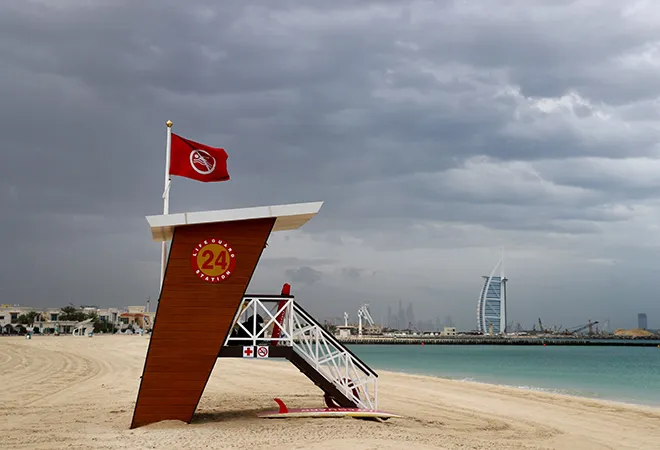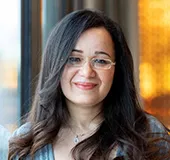-
CENTRES
Progammes & Centres
Location
The nature, frequency, and messaging in the communication that the government is taking, boasts of information, connectivity, and authenticity — all pillars of authentic communication that is a critical ingredient in crisis communications.

News on the COVID-19 pandemic first started to appear in the Middle East press at the end of January. Indeed, it began as a reference to a ‘China-based virus’ and concerns were focused on the global supply chain, and travelers or interactions with travelers from China. Soon enough, the conversation came closer to home, and we began to see actions from government and organisations like travel bans and restrictions.
I am an Egyptian living in the UAE, with professional responsibilities for various markets across the Middle East and North Africa (MENA) region. I also have family and friends in almost every part of the world, and so my interest on the progress of the pandemic has been professional and personal. I do not have any ‘behind-the-scenes’ insight as to how the decisions were made by the various government bodies involved; my observations here are from personal experience as a resident of the UAE and a professional communicator.
In the UAE, the government took on a leading role in managing the crisis from an informative, regulatory and economic perspective. The focus was “safety first,” with the early messages being balanced, precautionary and non-intrusive. Then the government worked its way up to a more authoritative, directive approach. For context, the UAE is largely an expat community, a key transit hub and holds some of the world’s largest trading ports. In the first and last quarters of the year, it often plays host for exhibitions, conferences, entertainment and sporting events. In short, there are a lot of people coming in and out of the UAE every day.
I will reference one government communication portal, Dubai Media Office, to showcase my experience and comments about how the UAE government are managing the COVID-19 pandemic.
I tracked the Dubai Media Office on Instagram to see the government’s response to the pandemic. Their first post about COVID-19 was on 2 March. From then on, they continued with their regular updates on other topics, with various updates on COVID-19 precautionary measures, focusing on the sterilisation of public spaces and explanatory health messages. They used a wide array of communication formats, including video, graphics and expert short interviews on transportation, ports and schools. In the next phase, they focused on reassuring the public of the country’s medical readiness, with stats on ambulances and hospitals, and the launch of #AskDXBDoctors, which connected medical professionals and had pre-recording messages about frequently asked questions.
Noteworthy was the appearance of ruling family members, practicing precautionary measures themselves such as social distancing and adopting virtual meetings. They also recognised (in person) the medical staff and frontliners for their efforts in protecting the public against COVID-19. At this point, they started issuing daily posts about the lockdown of certain sectors, such as entertainment, that needed to be temporarily closed for some time. They also issued recommendations to high-risk individuals within the community, including the elderly and pregnant women, to work remotely. By 19 March, various government funds and finance relief packages were already announced. On 21 March, the National Sterilisation Program was announced, requiring a national stay-at-home mandate from the evening to early morning (8 p.m. to 6 a.m.). Vital sectors of the economy — manufacturers, ports, medical, media and police — were exempt from the lockdown. Explanatory videos supporting their exemption and recognising their efforts was a key part of the communication programme.
As on 28 April, the UAE had the highest number of tests per 1 million people in the region ( 106,904), according to WHO statistics.
Some of the key levers of success in the management of the pandemic included the mobilisation of all resources available to the government. Dubai Media Office posts included directives from the health ministry, the Knowledge and Human Development Authority, the Roads and Transport Authority, and the Department of Economic Development, to list a few. They all worked towards the same message and seemed to follow the same strategic approach of awareness, preparedness, support and containment. Even the Burj Khalifa was lit up with #StayHome. There has been a notable increase in the number of police patrols not only to regulate but to help people as well.
Technology was also used to enable the process. Once the National Sterilisation Programme was extended to a 24-hour lockdown, the public was required to register for ‘move permits’ to go out in public. Like most other processes in the UAE, such as paying for parking or recharging your toll card, this was as simple as registering your details on an online portal and receiving the permit on your mobile within minutes. At the early stages of the lockdown, all citizens received a mobile alert to stay home. Given the multiple councils and initiatives that are set up, this indicates that the decisions are data driven. The high number of tests is facilitated by the multiple testing facilities, such as the mobile drive-thru facility, and medical centers that were quickly put in place in various parts of the country, as well as the proactive approach of targeting densely populated areas first.
The use of technology is not new to the UAE. The government has been focusing on innovation and technology for many years, setting the right foundation for smart cities and online activation. This facilitated the quick turnaround for transforming almost all government processes online.
The government was quick to amend and create regulations that support this ‘new normal’ and facilitate the day-to-day lives of all people living in the UAE. A welcome regulation was the extension of all resident visas until the end of the year. In general, if you are no longer employed in the UAE, you need to exit the country within 30 days. The new regulation reassures all residents that they can continue to stay in the country, regardless of their employment status. An earlier regulation was to halt any evictions or hold on bank accounts, again a much-needed step to reassure the public and ensure that they are not stranded during the lockdown and time of crisis.
Finally, the nature, frequency, and messaging in the communication that the government is taking, boasts of information, connectivity, and authenticity — all pillars of authentic communication that is a critical ingredient in crisis communications. The communication was factual and referenced medical information and science. Early on, a wide array of medical information was disseminated to the public by health practitioners in various languages, reflecting the diversity of the population.
The road to recovery is all about striking a delicate balance between safeguarding the health of the people and our economies. It is a daunting task for all decision-makers, given the pandemic’s massive impact. The experience in the UAE so far has been a gradual, staged, informative approach towards the lockdown. I would expect that the same approach will be followed for the recovery and road back to our new normal.
The views expressed above belong to the author(s). ORF research and analyses now available on Telegram! Click here to access our curated content — blogs, longforms and interviews.

A specialist in the communications with over 20 years experience in multinational &: regional companies across the Middle East North Africa (MENA) region Mai has ...
Read More +